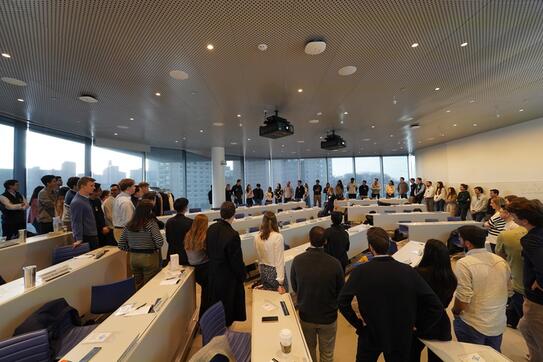
Understanding Human Decision Making
The Center facilitates research and understanding on consumer behavior, the implications of decision making on public policy, and the neurological underpinnings of judgment and decision making. The Center provides assistance of various sorts to researchers, including advice on research design, data acquisition, and data analysis. The interests of the CDS core organizers have grown and continue to grow over time. Much like a puzzle, the interests come together to build a bigger picture.
Our Mission

The Center for the Decision Sciences (CDS) serves as a resource to encourage dialogue and collaboration among researchers in multiple divisions and disciplines at Columbia Business School and to facilitate dialogue with and research transfer to industry experts and public policy makers. Our goal is to generate and facilitate interdisciplinary basic research that is relevant to the needs of real world decision makers.
Our History

Decision science lies at the intersection of several social and behavioral science disciplines, drawing on theory and methods from economics, psychology, political science and management, among other fields. Theory and research in the decision sciences has followed two paths: The first is normative or prescriptive, focused on specifying criteria for evaluating decisions and providing algorithms for achieving optimal outcomes; the second is descriptive, focusing on how people actually make decisions.
Our Education

Decision science lies at the intersection of several social and behavioral science disciplines, drawing on theory and methods from economics, psychology, political science and management, among other fields. Theory and research in the decision sciences has followed two paths: The first is normative or prescriptive, focused on specifying criteria for evaluating decisions and providing algorithms for achieving optimal outcomes; the second is descriptive, focusing on how people actually make decisions.
Decision Science Research
DEEP
DEEP is an adaptive method that dynamically designs elicitation questions for estimating Risk and Time preference parameters.
DOSPERT Scale
DOSPERT is a psychometric scale that assesses risk taking in five content domains: financial decisions(separately for investing versus gambling), health/safety, recreational, ethical, and social decisions.
Columbia Card Task
Risk taking behavior in everyday-life typically follow a characteristic developmental pattern. They are low during childhood, increase sharply with puberty, peak in adolescence and early adulthood, and decline again during muddle and late adulthood.
Participate
The Center for Decision Sciences has dual educational and research purposes: to offer cross-training to graduate students and post-docs in decision sciences aspects not covered in their home disciplines.



